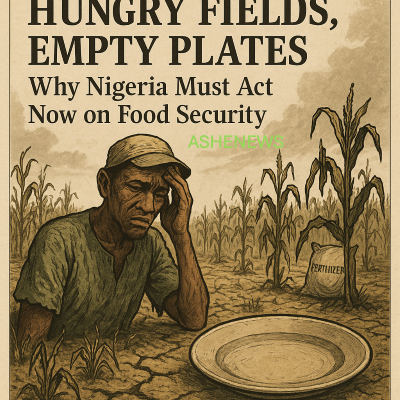By Abdallah El-Kurebe
In villages once brimming with life and harvest, silence now hangs in the air. The rhythm of hoes tilling the land, of grain-laden trucks heading to market, and of farmers trading smiles over a good yield is fast becoming a distant memory. Across Nigeria, the agricultural sector, once our pride and provider, is withering under the pressure of climate change, growing insecurity, and government inaction.
Today, hunger is no longer just a problem of the poor, it is a growing reality for middle-class families too. A bag of rice, a staple in most homes, now costs more than what a minimum wage earner can afford in a week. Tomatoes, maize, beans, and onions are becoming luxuries. Behind these rising prices lies a story of neglect, danger, and deepening despair.
Farmers can no longer access their lands without fear. Armed groups roam freely across farming belts, kidnapping, killing, and forcing rural families to flee. Communities in Katsina, Niger, Benue, Zamfara, and even parts of the South are losing their livelihoods overnight. How can a farmer think of planting when survival is not even guaranteed?
And for those who dare to stay and plant, help is far from their reach. Fertilizers arrive late, if at all, and at prices that most small-scale farmers cannot afford. Government support, when it comes, is often tangled in bureaucracy or hijacked by middlemen. Year after year, the same promises are made, yet the fields remain empty and the barns unfilled.
Climate change is not waiting for us to act. Rains are coming too soon or not at all. Floods drown entire farms while droughts scorch others. Yet, the national response remains disjointed and underwhelming.
It is time to stop pretending that this is just a passing crisis. It is not. Nigeria is staring at a full-blown food emergency.
We must face this truth with honesty and urgency. The government must declare a National Food Emergency, not as a symbolic gesture, but as a springboard for real action. This includes convening a National Food Security Summit where voices from farming communities, agribusiness, civil society, research institutions, and the private sector can sit at the same table. We need a unified, practical, and well-funded plan to protect our farmers, boost local food production, and make agriculture work again.
The solutions are known: timely and affordable inputs, rural security, irrigation systems, storage infrastructure, climate-smart farming, and stronger agricultural extension services. What’s missing is the political will and the urgency.
Nigeria can not continue to import what it can grow, especially not when our people are hungry, our farmlands lie fallow, and our farmers are living in fear. If we fail to feed ourselves, no amount of oil revenue or foreign debt will save us.
This is not just about economics. It is about survival, dignity, and justice. Let us not wait until hunger becomes the loudest voice in the room.





